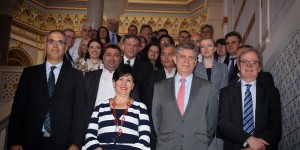Speech by Massimo Mina, Head of Operations section for Social Development, Civil Society and Cross Border Co-operation at the Final Conference of the project ‘Development of Higher Education and Qualification Standards’
Dear Ministers, Rectors, Mr Bergan, Ms Hennessey, dear colleagues, guests, representatives of the media,
It is my pleasure to greet you all on behalf of the Delegation of the European Union to Bosnia and Herzegovina and to speak on this important subject, higher education reform.
I am especially glad that this event is happening during Bosnia and Herzegovina’s Chairmanship of the Committee of Ministers of the Council of Europe.
Today we are marking the end of the joint EU/CoE project on Development of Higher Education and Qualification Standards in BiH.
I am happy to say that the project succeeded to improve standards and quality of higher education, as well as comparability of BiH education system with other countries.
Unfortunately, its contribution to policy and strategic planning in higher education remains under question, pending the adoption of the draft document on priorities for higher education reform in BiH during next 10 years. This valuable document, which reflects the needs of higher education institutions, decision makers and, most importantly, students, is the result of joint work by representatives of academic community from all parts of BiH.
The reform of education is one of the major driving forces in the process of reaching the economic targets of the EU Agenda 2020. I am confident that BiH authorities’ commitment to socio-economic reforms will contribute to a more positive climate for endorsement of this document.
Higher education has a pivotal role in this process as it is generating the knowledge, skills and innovation that help to overcome the economic and financial crisis and contribute to growth and prosperity.
The 4th meeting of ministers of education from Western Balkan region, which was organised by DG Education and Culture last week in Albania, confirms that higher education is on top of EU priorities. Each country from the Western Balkans, including BiH, presented one specific example of reform in higher education, future cooperation and next steps, such as the importance of adoption of new strategic documents, the focus on impact and coherence of support, the link between past and future projects and programmes.
I would also like to add that the European Union has been an active and committed member of the Bologna Process from the beginning and it has invested significantly in education and training programmes helping to strengthen the European Higher Education Area.
Via the Erasmus+ programme, internationalisation of higher education became a reality. This programme also enhanced attractiveness of European higher education, it offered opportunities for students to improve their skills and employability, and encouraged education institutions to work together.
It is worth reminding that in BiH, the EU has invested more than 6 million EUR for reform of higher education since 2003 (through CARDS and IPA funds).
For this project that we are closing today, the EU provided 1 million EUR, and our partners in implementation, Council of Europe, provided the remaining funds in the amount of 115.000,00 EUR.
In spite of our large investment, we are not satisfied with results and progress of reform processes in this area.
• There is still a need to develop clear progression routes from vocational and other education types into higher education.
• Further development of qualification framework in BiH for higher education linked to the European Qualifications Framework – which has been supported through this joint EU/CoE project – is badly needed.
• In addition, there is a need to involve employers and labour market institutions in the design and delivery of programmes, including practical experience in courses. Indeed, this would help aligning curricula to current and emerging labour market needs and foster employability and entrepreneurship.
I call on higher education institutions and decision makers at all levels to continue working on the results of this project and in general on higher education reform. I encourage you to use this project as a model and to disseminate the acquired knowledge. I would also like to thank our partner, the Council of Europe, for their work, and all Ministers of education for their support to the project.
We remain committed to this process and expect that the current difficulties will be soon resolved, enabling the EU to provide further financial support, which is important for the future of this country and its citizens, young people in particular.
Thank you.



